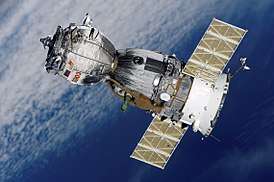Soyuz TM-1
Soyuz TM-1 was an unmanned test flight of the Soyuz-TM spacecraft, intended for use in the Mir space station program. This was the maiden flight of the Soyuz-TM spacecraft, intended as the successor to the Soyuz-T spacecraft used in the Salyut program.[1] It docked to Mir on 23 May 1986, and undocked on the 29th.[2] It was the last uncrewed Soyuz flight until Soyuz MS-14, in 2019.
| COSPAR ID | 1986-035A |
|---|---|
| SATCAT no. | 16722 |
| Mission duration | 9 days |
| Spacecraft properties | |
| Spacecraft type | Soyuz-TM |
| Manufacturer | NPO Energia |
| Launch mass | 6,450 kilograms (14,220 lb) |
| Start of mission | |
| Launch date | 21 May 1986 UTC |
| Rocket | Soyuz-U2 |
| Launch site | Baikonur 1/5 |
| End of mission | |
| Landing date | 30 May 1986 UTC |
| Orbital parameters | |
| Reference system | Geocentric |
| Regime | Low Earth |
| Docking with Mir | |
| Docking date | 23 May 1986 |
| Undocking date | 29 May 1986 |
Mission parameters
- Spacecraft: Soyuz-7K-STM
- Mass: 6450 kg
- Crew: None
- Launched: May 21, 1986
- Landed: May 30, 1986
gollark: Well, if you were observing an egg from something moving at relativistic speeds, then it would - to you - age faster, I guess, yes.
gollark: If I remember correctly, travelling faster means the external world moves faster to you.
gollark: THAT'S ENTIRELY REASONABLE!
gollark: WHAT'S THE PROBLEM?
gollark: "in my reference frame, it's older"
References
- "Soyuz TM". Astronautix. Retrieved 30 October 2016.
- "Soyuz TM-1". WorldSpaceFlight. Retrieved 11 February 2016.
This article is issued from Wikipedia. The text is licensed under Creative Commons - Attribution - Sharealike. Additional terms may apply for the media files.
